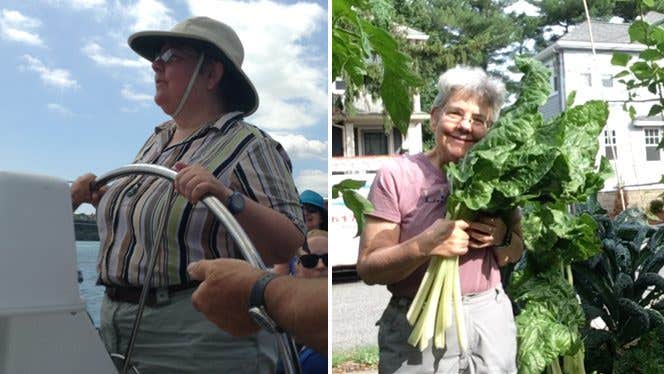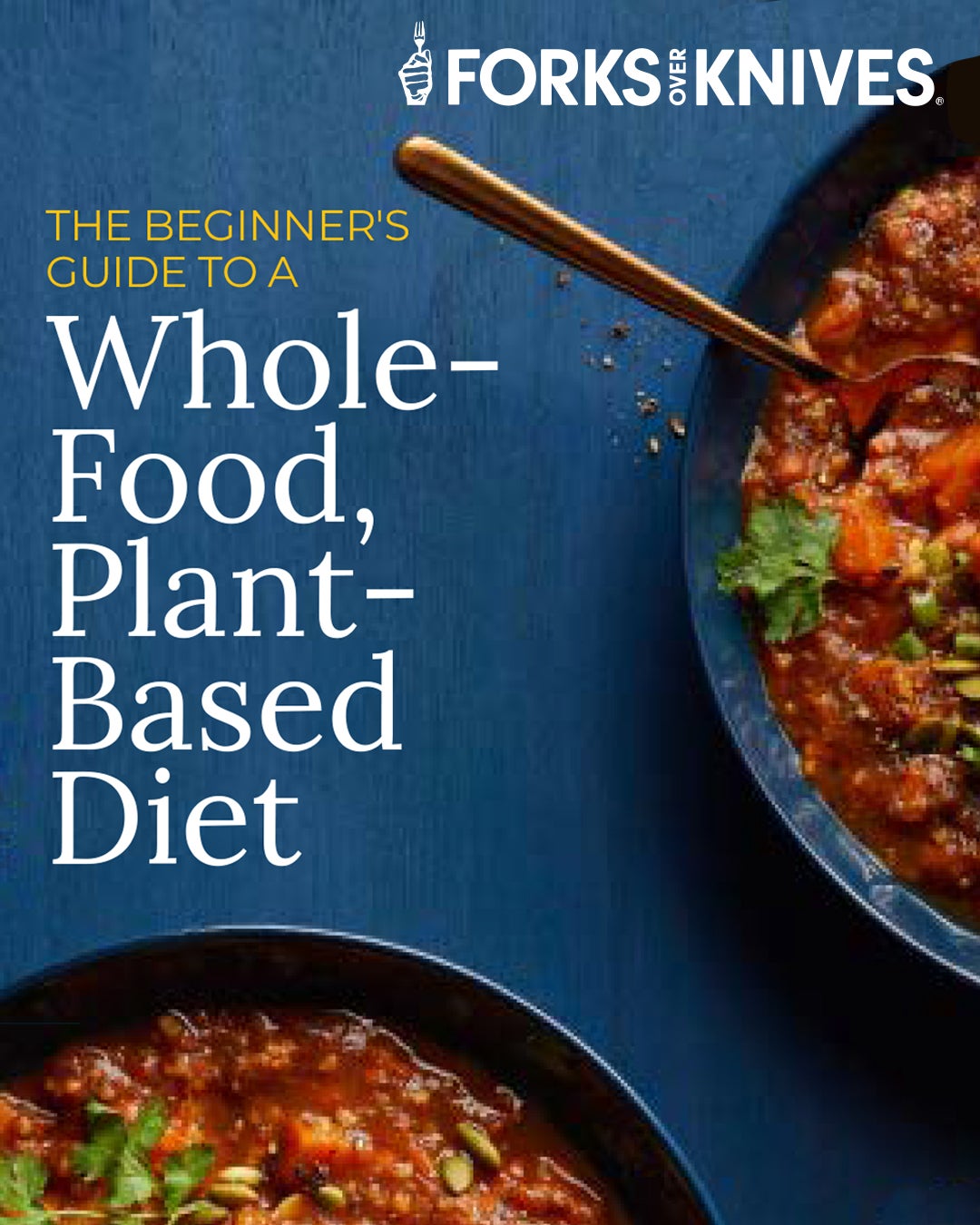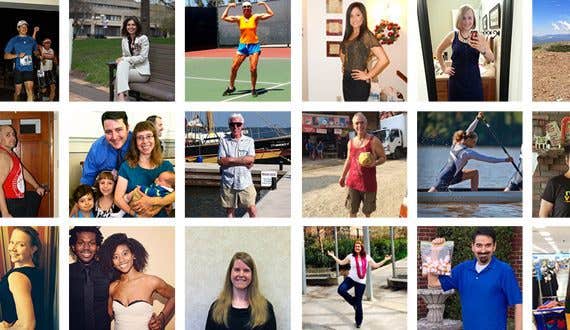
After Decades of Dieting and Depression, I’m Healthy and Happy on a Plant-Based Diet
By Karen Steiner,
I started dieting at the age of 9. Every time I lost weight I swore to myself that I’d never regain it—but every time, the old habits returned, along with the weight.
By 2013, at age 55, I was at the end of my rope. I was in the grips of a lifelong depression that had suddenly gone from bad to worse, and my feet and knees ached relentlessly. At just 4-foot-11, I weighed 220 pounds. (That’s a BMI of 44.) I knew that I couldn’t continue on that path, but another round of counting calories and portion control was out of the question.



GET OUR FREE 20-PG ULTIMATE PLANT-BASED BEGINNER'S GUIDE
Let us guide you to better health
(plus get our most popular recipes!)
The first thing I did was start a mindful eating practice—without which, I’m convinced my transformation wouldn’t have been possible. By paying attention to my food, thoughts, and feelings, I was able to start to understand what was driving me to overeat. This wasn’t a speedy process. It took nearly two years. But it laid the foundation for what was to come.
The first time I saw Forks Over Knives, something didn’t quite connect in my brain. I was a lacto-ovo vegetarian and in so much denial that I didn’t see that the diet style presented in the documentary was radically different from mine—possibly because I was still buying into the whole “everything in moderation” myth, thinking that there was nothing wrong with eating a small amount of cheese every day.
A 2-Week Experiment
My eyes were opened when I started researching the connection between inflammation and depression. I stumbled upon the research of Michael Greger, MD, a whole-food, plant-based doctor. After that, I rewatched Forks Over Knives, and the dots connected. I realized that dairy was likely contributing to my depression and probably to my weight problems, too.
One of my first thoughts was “Oh please—anything but dairy!” I loved cheese; in fact, I felt that nothing tasted good unless it was buried under a mountain of it. But I decided that I would give up dairy as a two-week experiment. After all, I could endure anything for two weeks.
I lost 7 pounds within a matter of days, which was a huge motivator. By the end of the two weeks I was starting to think that maybe I was on to something. I extended my experiment for another month. I continued to lose weight and decided that I’d need to give it a full six months, just to be sure.
The cravings set in around that time. I wanted pizza badly. I wanted cheese; I wanted ice cream. These weren’t the kinds of cravings that you can easily distract yourself from. They were intense and unrelenting. In hindsight I can see that it was probably a kind of withdrawal. Cheese was my drug, and I wanted it. Forks Over Knives helped sustain me. I probably watched it once a week during that period. It provided the motivation I needed to keep going.
Once I was off dairy, I gradually made other changes, eating far more vegetables than I ever thought possible, phasing out salt and oil, and exercising more.
My Life Now
Since going whole-food, plant-based more than five years ago, I’ve lost 90 pounds. The lifelong depression has lifted, and I’ve taken up a more active lifestyle, running three 10Ks and numerous 5Ks (although I had to switch to bicycling in the past year, as my knees were too badly damaged from a lifetime of obesity to continue running).
Now, I help others live a healthier life. I earned a certificate in plant-based nutrition from the T. Colin Campbell Center for Nutrition Studies. I’m a coach, specializing in helping people who have a long history of yo-yo dieting, and I have a YouTube channel where I demonstrate the preparation of whole-food plant-based meals. I know the old habits aren’t coming back this time. I feel too good.
4 Foods I Batch-Cook Every Week
When you have the building blocks ready to go, healthy weekday meals come together quickly. Here are a few staples that I batch-cook regularly.
Whole Grains: Intact whole grains are integral to a whole-food, plant-based diet, and my fridge is rarely without a bowl of them. I like to mix and match, combining a few grains that cook similarly, such as brown rice, whole barley, rye berries, and/or whole spelt.
Vegetables: Roast a medley of your favorite veggies on the weekend to add to tacos, burritos, grain bowls, and more throughout the week. I roast three large trays of bell peppers, red onions, mushrooms, broccoli, and cauliflower, and like to mix in at least one seasonal veggie.
Potatoes: After roasting my veggies, I keep the oven hot and bake several Yukon Gold potatoes and sweet potatoes. Baked sweet potatoes freeze well: Cut them into thirds; place the pieces on a sheet pan in the freezer. Once frozen, transfer the pieces to a freezer-safe zip-top bag. Thaw in the microwave as needed.
Breakfast Oats: Once a week, I cook a big pot of whole oat groats and divide it into three containers. I refrigerate one and freeze the other two. When I’ve eaten the batch in the fridge, I pull one from the freezer and let it thaw, refrigerated, for 24 hours.
Ready to get started? Check out Forks Meal Planner, FOK’s easy weekly meal-planning tool to keep you on a healthy plant-based path. To learn more about a whole-food, plant-based diet, visit our Plant-Based Primer.
Has a whole-food, plant-based diet impacted your life?
We would love to hear about it!
SHARE YOUR STORY
Join our mailing list
Get free recipes and the latest info on living a happy, healthy plant-based lifestyle.
By providing your email address, you consent to receive newsletter emails from Forks Over Knives. We value your privacy and will keep your email address safe. You may unsubscribe from our emails at any time.
